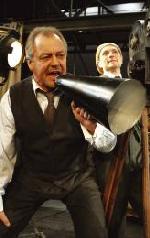SITE MAILSEARCH
REVIEWS
FEATURES
NEWS
Etcetera and
Short Term Listings
LISTINGS
Broadway
Off-Broadway
NYC Restaurants
BOOKS and CDs
OTHER PLACES
Berkshires
London
California
DC
Philadelphia
Elsewhere
QUOTES
On TKTS
PLAYWRIGHTS' ALBUMS
LETTERS TO EDITOR
FILM
LINKS
MISCELLANEOUS
Free Updates
Masthead
Writing for Us
A CurtainUp  London Review
London Review
 London Review
London ReviewMack and Mabel
|
What is an artist for if he can't change life?
---- Mack |

David Soul as Mack Sennett
(Photo: Alastair Muir) |
Mack and Mabel follows the real life story of movie director Mack Sennett, the creator of Keystone Cops (and, incidentally, the famous Hollywood sign) and Mabel Normand, whose successful career became increasingly plagued by addictions and scandal. Against a background of farcical film cops, impoverished movie-making and the glitz of a still young Hollywood, Mack's harshly unsentimental love for Mabel and Mabel's gradual but irreversible decline are portrayed.
Like Doyle's Sweeney Todd, the cast stay onstage for almost the entire evening and, whilst acting, singing and dancing, they play their own instruments. This is an inventive, lively style full of spirit. However, there are several drawbacks, such as the loss of intimacy during love songs between Mack and Mabel, actors in character inexplicably holding a musical instrument, or the distracting choreography whereby the cast pretend to play their instruments.
I cannot also help but feel that the original production in the Watermill Theatre, Newbury has lost some of its impact in the transfer to the Criterion. It still has the feel of a pared-down, low-budget yet resourceful production which worked so well in the tiny but unconventional Watermill theatre. On this larger stage, parts could have been portrayed with more scenic enrichment. For example, when a film scene which they are recording is set in Ancient Rome, just one toga would have added some atmosphere of the cinematic set. Again, when Mabel discovers Mack in the arms of another actress, this would have been far clearer and more poignant if the narration was accompanied by an onstage enactment.
In terms of performances, Janie Dee is an endearing Mabel, played with ingenuous charm and helpless pathos as she self-destructs. David Soul is well-suited to the part of the tough and cynical Mack, only able to express love for movies rather than people. Also notable was Tomm Coles as Frank, who acted and played the saxophone with flair.
The music is very good, jauntily memorable and familiar to much of the UK after British world champions Torvill and Dean famously skated to it. However, the music's sprightly appeal constitutes both its strength and weakness, and it is jarringly incompatible with the gritty, biographical material it is meant to portray. In spite of this production's good points, there remains a glaring inconsistency between "musical comedy theatre" and the true life tragedy of drug abuse, frustrated love, scandal, broken careers and premature death.
|
MACK AND MABEL
Music and Lyrics by Jerry Herman Book by Michael Stewart with revisions by Francine Pascal Directed by John Doyle Starring: David Soul, Janie Dee With: Richard Brightiff, Tomm Coles, Robert Cousins, Michelle Long, Robin Pirongs, Jon Trenchard, Simon Tuck, Sarah Whittuck, Matthew Woodyatt Design: Mark Bailey Lighting: Richard G Jones Sound: Gary Dixon Arrangements and Musical Supervisor: Sarah Travis Running time: Two hours with one interval Box Office: 0870 060 2313 Booking to 22nd July 2006 Reviewed by Charlotte Loveridge based on 11th April 2006 performance at the Criterion Theatre, Piccadilly, London W1 (Tube: Piccadilly Circus) | |
|
Musical Numbers
| |
Act One
Movies Were Movies Look What Happened to Mabel Big Time I Won't Send Roses I Wanna Make the World Laugh Wherever He Ain't Hundreds of Girls |
Act Two
Overture When Mabel Comes In the Room My Heart Leaps Up Time Heals Everything Tap your Troubles Away I Promise You a Happy Ending |
Information from this site may not be reproduced in print or online without specific permission from esommer@curtainup.com





